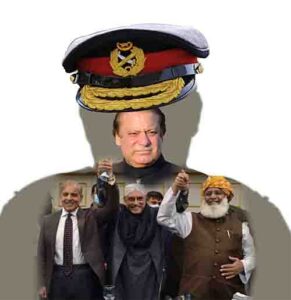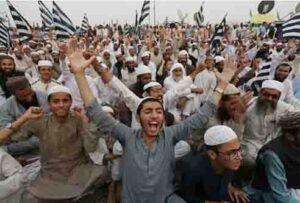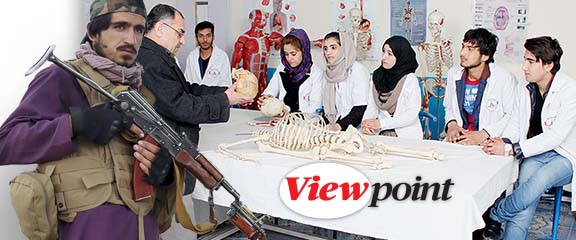In a world which is enveloped in a culture of deceit, speaking the truth is a difficult act. But it must be spoken because only truth can lift the curtain of treachery and perfidy the world is so wholesomely mired in. It must also be spoken because, otherwise, the harrowing shadows that loom will obliterate the human capacity to comprehend its pivotal importance and the courage to spread it around.
The battle between truth and falsehood is as old as the world itself. In spite of the pervading spectre of darkness, truth has always managed to shine through and spread its rays for others to carry forth. Although, with time, there has been a sharp depletion of its torchbearers, yet its passionate adherents have borne the spirit to break through layers upon layers of duplicitous and perfidious machinations.
It must also be conceded that telling the truth was never more daunting than in the present times which are ripe with evil. It appears everyone is trying desperately to keep the burden of truth buried under piles of compromises that need to be made either to survive a loathsome life cycle, or indulge further in a spree of unbridled loot and plunder. In either case, this burden is gradually becoming unbearable which may soon have to be dispensed with. The question is when and how?
The country was launched adrift a trajectory of degenerative espousals early on which was in stark contrast with the Quaid’s understanding of a liberal Pakistan, outlined in his August 11 speech. This was gravely compromised by his closest lieutenants to secure their personal place in the ruling echelons which cost the country dearly in terms of building and nurturing a progressive ethos. The role various individuals and institutions have since played in perpetuating this regression has been monumental. This has not been based on any deep and long-term thinking, but on an extremely myopic understanding of the concept of a nascent state and the need to embed its growth in a progressive narrative that would be based on advancing the principles of equity, equality, social welfare and justice, and not creating a reactionary entity wedded to obscurantism practised along the discriminatory benchmarks of faith, caste, colour and creed of its people. These are the very features which the Quaid had warned against in his landmark speech from the floor of the first constituent assembly and also through interactions with various communities across the country during a very short period of time that he lived after putting Pakistan on the map of the world as an independent country. The manner in which he was left to die by the roadside in an ambulance is gruesomely symptomatic of the utter lack of respect that both his contemporaries and subsequent leaders showed to principles that he had enunciated so passionately and so fulsomely about the kind of state that he envisioned Pakistan to become.
Unfortunately, ever since, it has been a downward slide with the country falling deeper in the pit of regression. Over time, a reactionary attitude and propensity to violence have become the most distinguished features of its growth. There are multiple factors which contributed to these ailments, spearheaded malevolently by both the so-called democrats and dictators. No one has been an exception, be it the sequence of military rulers, or Bhutto/Zardari clan, the Sharifs or the leaders of the sprawling religious parties whose seminaries indoctrinate impressionable minds to use violence as an integral constituent of their thinking and actions. Absolutely no one has been an exception. Everyone chipped in with their respective dose of evil doing.
The wise people always say that religion should never become a political weapon. They further contend that once it is sucked into the political domain, it becomes impossible to dig out. It is then embedded there to gradually assume a sacrosanct and unchallengeable position. It grows to influence every decision of the country and guide it along unenlightened and retrogressive lines. It becomes law onto itself, thus eliminating recourse to institutions which may have the expertise and ability to handle issues in a just and pragmatic manner. With the passage of time, we see it wrapping the state in its warped and jaundiced apparel.
In this cauldron of conflict and contradictions, a mafia representing the worst of everything got a stranglehold on the country, a grip which has only tightened with the passage of time. It comprises the 1% beneficiary elite which holds sway over the entire policy-making spectrum of the state and influences it to their exclusive advantage. In the process, they rob the state of its resources and its potential and simultaneously perpetuate their dynastic hold so that they or their progeny could maintain their control through times in the future. That is how the Bhutto/Zardari, Sharif, Chaudhry, Fazlur Rehman, and such other dynasties took shape in Pakistan who tossed the state among them to rape and pillage. So, while their personal coffers are spilling over with pelf and their illicit palatial properties are spread throughout the world, the state, having been denuded of its assets, its potential and promise, is tottering on the brink of default to the utter shame and angst of its people.

All ruling dynasties have enjoyed the patronage of the establishment one way or the other. As a matter of fact, a lot of them were virtually nurtured in their laps, having served as members of the government whenever the military imposed its direct rule. Bhutto was a member of the cabinets of Iskandar Mirza and Ayub Khan for over eight years before launching his own political party, then moved on to become a member of General Yahya Khan’s cabinet and played an evil role in the dismemberment of the country only to become the prime minister of a truncated Pakistan. The Sharifs were the find of General Zia who served time in the military cabinets before being catapulted to rule as chief minister and later as the prime minister of the country. The Chaudhrys of Gujrat have forever served the military dictators, even vowing to help them rule for a thousand years. The religious parties have always been used by the establishment as touts to advance their interests. In short, the military has ruled directly through four phases and, most of the rest of the time, it has ruled through its anointed proxies it trained for the purpose. Whenever any of them stepped out of the chartered line, they were eased out through one constitutional concoction or the other, only to find their way back into power by resorting to their conniving practices.
It is only with Imran khan that the military has met its match. In his bid to serve the interests of the state, when he tried pursuing an independent foreign policy and stretching Pakistan’s reach across to Russia, it did not fit in well with the military’s traditional line of affinity with the West, particularly the United States. Since no one had dared doing it earlier as the interest of the state never figured in the calculations of these rulers, the US and the military both reacted negatively. One remembers the conflicting policy statements given by Prime Minister of the country Imran Khan on day one and the Chief of Army Staff General Bajwa on day two of the Islamabad Security Dialogue where the charter of Pakistan transiting from geo-strategic to geo-economic was unveiled. While the Prime Minister spoke about his outreach to Russia and its need in contemporary times, the COAS went the other way, reiterating Pakistan’s irrevocable commitment to the US and not letting these relations be impacted in any manner. This was virtually treasonous, but he escaped being asked to explain his public posturing in contravention of the government’s policy stated a day earlier.
The COAS’s statement also reflected a pitiable lack of understanding of either politics, or how national interests are defended and furthered. The improvement of relations with Russia need not have come at the cost of Pakistan’s relations with any other country, including the United States. It was only an effort by Khan to assert Pakistan’s independence to take decisions that suited its strategic and economic interests. When the cipher outlining the US threat hurled through Donald Lu, Assistant Secretary of State for South and Central Asian Affairs, was received, one knew that Khan was no longer acceptable to either the US, or the establishment, and it was only a matter of time before he would be ousted. The end did not take long in coming, but it exposed the myth of Pakistan’s independence. It was palpably clear that the much-celebrated word could only be written and harangued, but not practised, and the one who tried doing it to bring benefit to the country would not survive as was to be the fate of Khan who was forced to relinquish office through a foreign-dictated and locally collaborated conspiracy.

But this is also where the difference between Khan and the rest of the political clan came forth. While his predecessors, after their ouster, would try to mend fences with the establishment to stage a come-back, which they would indeed succeed in doing after the lapse of some time, Khan has since taken a principled position that democracy does not bring such unconstitutional and illegal intervention by the establishment. His fight is for reforming the system through getting a mandate from the people. This is what he has been endeavouring for over the last nine months and remains determined to persist till the objective has been finally achieved. In this struggle, he is not only confronting the 13-party conglomerate of crooks, convicts, under-trial criminals and absconders, but also has to contend with their patrons, the establishment, who are trying to eliminate him from the political calculus by using the most fascist and draconian version of the state power. This has not worked so far, and the likelihood is that it will not work in the future either as crowds, in the hundreds and thousands, surge to his side whenever Khan gives out a call. Their numbers, passion and commitment have no parallel in the political history of Pakistan, recent or past.
The question that arises is whether all this is having an impact on the new command at the GHQ and their operatives spread through various layers of the institution? Do they still believe that they can push through their bruised and battered narrative without inflicting irreparable damage upon the country? Do they still hold forth that their interventionist practices can survive the rigours of changed times and expectations? Making people at the helm realise the absurdity of these perceptions constitutes the contours of the battle which is raging between the gang of crooks together with their patrons on the one side, and Khan, all by himself with deep-set faith in the support of the people, fighting determinedly on the other side. He is not waging this battle for himself, or his coterie of colleagues. It is a battle that he is fighting for Pakistan which has languished in the depths of dark dungeons for over 75 years because of the very same criminal conundrums. With default staring in the face, the anointed leaders have gone to the world with a begging bowl in hand, without any substantial success. If a wholesale change of approach is not initiated immediately, Pakistan will not only continue to falter in its struggle for meagre survival; it may actually go down under.
Here I discharge my burden of telling the truth: if some bloated egos are more important than the state, there would be no remedy. But it should be remembered that the country is left with trifle little to waste at the altar of these egos infatuated with an insatiable lust for control. It needs a prognosis strictly within the bounds of the law and the constitution which is contained in the exercise of holding free, fair and transparent elections, without any interference by the forces of the establishment. Otherwise, there is us and there is the abyss. There is nothing in between to stop the slide.



